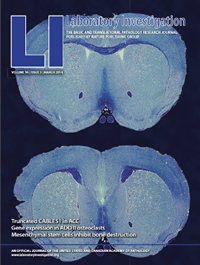Ms. Dinh Tra Thi Huong, 3rd year student, published a first author paper “Truncated Cables1 causes agenesis of the corpus callosum in mice” in Laboratory Investigation.
Truncated Cablesl causes agenesis of the corpus callosum in mice.
Although agenesis of the corpus callosum (ACC) in TAS mice is probably induced by transgene insertion mutation, the causative gene and its pathological mechanism have not yet been clarified. In this study, they identified the genomic insertion site of the transgene on chromosome 18 at ~ 12Mb from the centromere by multicolor fluorescence in situ hybridization (FISH) analysis. Furthermore, the insertional mutation was shown to generate a novel mutant allele expressing truncated Cablesl mRNA. Analysis of Cablesl-null mutant mice indicated that complete loss of function of Cablesl did not contribute to callosal malformation. Finally, we demonstrated that the frequency of ACC in Cablesl +TAS mice was significantly lower than that in Cablesl -TAS mice. These data suggest that ACC in TAS mice is caused by the N-terminal half of Cablesl, amolecule responsible for the complex organization of the corpuscallosum.
This work was published in Laboratory Investigation (Nature Publishing Group) in March, 2014. The journal cover in March shows ACC in TASmice
LINK
- Nature.com (Laboratory Investigation)
"Truncated Cables1 causes agenesis of the corpus callosum in mice"
(Mizuno S. Dinh TT et al, 2014. 94:321-330)










